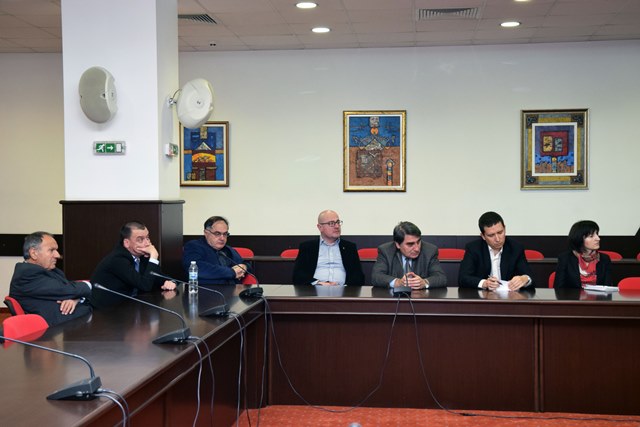A Russian Club was established at the university. At the event attended a lot of lecturers from different Departments of UNWE as well as Zhelyo Dobrev, Chairman of the Bulgarian-Russian Chamber of Commerce and Industry and Nikolay Malinov, Chairman of the National Movement of Russophiles. A lecture on the Modern Aspects of Bulgarian-Russian Economic Relations was delivered by Zhelyo Dobrev.
| Image may be NSFW. Clik here to view.  |
| Assoc. Prof. Dr. Ivan Stoychev, Director of the Institute of Postgraduate Studies and Head of the International Economic Relations and Business Department (in the middle) is opening the meeting. On the left next to him: Zhelyo Dobrev, on the right: Nikolay Malinov |
Members of the Bulgarian-Russian Chamber of Commerce and Industry are 230 companies which can contact with partners registered in 174 regional Chambers in the Russian Federation, pointed out in his lecture Zhelyo Dobrev. He explained the reason to consider Russia as first strategic partner of our country: it holds 12% of the total Bulgarian trade circulation, its participation in our import activity is 20% as well as 50-70% in the negative trade balance of our country are Russian. The lecturer commented also some specific data about the relations between both countries, specifics of the import and export activity, etc.
| Image may be NSFW. Clik here to view.  |
| Participants in the meeting |
Nikolay Malinov examined the main directions in the work of the National Movement of Russophiles. Bulgaria as Bulgaria exists as long as there is Orthodoxy, as long as there is Cyrillic, as long as there is our cultural identity as Bulgarians. The cultural identity of Bulgarians is related to their civilizational choice and it had been made 1250 years ago by St. Tsar Boris I, said Malinov.
| Image may be NSFW. Clik here to view.  |
| In the Large Conference Hall |
The newly formed Russian Club at the UNWE will assist for the cooperation with Russian educational institutions, exchange of academic professionals from both countries, close relations with the Slavonic language and cultural area.
